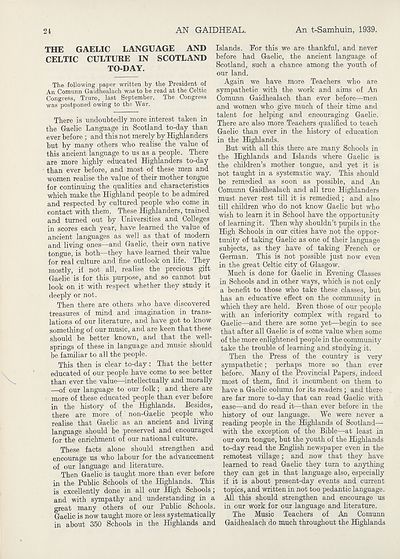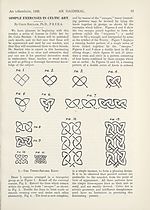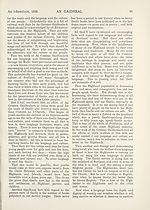An Comunn Gàidhealach Publications > Gaidheal > Volume 35, October 1939--September 1940
(32) Page 24
Download files
Complete book:
Individual page:
Thumbnail gallery: Grid view | List view

24
AN GAIDHEAL.
An t-Samhuin, 1939.
THE GAELIC LANGUAGE AND
CELTIC CULTURE IN SCOTLAND
TO-DAY.
The following paper written by the President of
An Comunn Gaidhealach was to be read at the Celtic
Congress, Truro, last September. The Congress
was postponed owing to the War.
There is undoubtedly more interest taken in
the G-aelic Language in Scotland to-day than
ever before ; and this not merely by Highlanders
but by many others who realise the value of
this ancient language to us as a people. There
are more highly educated Highlanders to-day
than ever before, and most of these men and
women realise the value of their mother tongue
for continuing the qualities and characteristics
which make the Highland people to be admired
and respected by cultured people who come in
contact with them. These Highlanders, trained
and turned out by Universities and Colleges
in scores each year, have learned the value of
ancient languages as well as that of modern
and living ones—and Gaelic, their own native
tongue, is both—they have learned their value
for real culture and fine outlook on life. They
mostly, if not all, realise the precious gift
Gaelic is for this purpose, and so cannot but
look on it with respect whether they study it
deeply or not.
Then there are others who have discovered
treasures of mind and imagination in trans¬
lations of our literature, and have got to know
something of our music, and are keen that these
should be better known, and that the well-
springs of these in language and music should
be familiar to all the people.
This then is clear to-day: That the better
educated of our people have come to see better
than ever the value—intellectually and morally
—of our language to our folk; and there are
more of these educated people than ever before
in the history of the Highlands. Besides,
there are more of non-Gaelic people who
realise that Gaelic as an ancient and living
language should be preserved and encouraged
for the enrichment of our national culture.
These facts alone should strengthen and
encourage us who labour for the advancement
of our language and literature.
Then Gaelic is taught more than ever before
in the Public Schools of the Highlands. This
is excellently done in all our High Schools;
and with sympathy and understanding in a
great many others of our Public Schools.
Gaelic is now taught more or less systematically
in about 350 Schools in the Highlands and
Islands. For this we are thankful, and never
before had Gaelic, the ancient language of
Scotland, such a chance among the youth of
our land.
Again we have more Teachers who are
sympathetic with the work and aims of An
Comunn Gaidhealach than ever before—men
and women who give much of their time and
talent for helping and encouraging Gaelic.
There are also more Teachers qualified to teach
Gaelic than ever in the history of education
in the Highlands.
But with all this there are many Schools in
the Highlands and Islands where Gaelic is
the children’s mother tongue, and yet it is
not taught in a systematic way. This should
be remedied as soon as possible, and An
Comunn Gaidhealach and all true Highlanders
must never rest till it is remedied; and also
till children who do not know Gaelic but who
wish to learn it in School have the opportunity
of learning it. Then why shouldn’t pupils in the
High Schools in our cities have not the oppor¬
tunity of taking Gaelic as one of their language
subjects, as they have of taking French or
German. This is not possible just now even
in the great Celtic city of Glasgow.
Much is done for Gaelic in Evening Classes
in Schools and in other ways, which is not only
a benefit to those who take these classes, but
has an educative effect on the community in
which they are held. Even those of our people
with an inferiority complex with regard to
Gaelic—and there are some yet—begin to see
that after all Gaelic is of some value when some
of the more enlightened people in the community
take the trouble of learning and studying it.
Then the Press of the country is very
sympathetic; perhaps more so than ever
before. Many of the Provincial Papers, indeed
most of them, find it incumbent on them to
have a Gaelic column for its readers ; and there
are far more to-day that can read Gaelic with
ease—and do read it—than ever before in the
history of our language. We were never a
reading people in the Highlands of Scotland—
with the exception of the Bible—at least in
our own tongue, but the youth of the Highlands
to-day read the English newspaper even in the
remotest village; and now that they have
learned to read Gaelic they turn to anything
they can get in that language also, especially
if it is about present-day events and current
topics, and written in not too pedantic language.
All this should strengthen and encourage us
in our work for our language and literature.
The Music Teachers of An Comunn
Gaidbealach do much throughout the Highlands
AN GAIDHEAL.
An t-Samhuin, 1939.
THE GAELIC LANGUAGE AND
CELTIC CULTURE IN SCOTLAND
TO-DAY.
The following paper written by the President of
An Comunn Gaidhealach was to be read at the Celtic
Congress, Truro, last September. The Congress
was postponed owing to the War.
There is undoubtedly more interest taken in
the G-aelic Language in Scotland to-day than
ever before ; and this not merely by Highlanders
but by many others who realise the value of
this ancient language to us as a people. There
are more highly educated Highlanders to-day
than ever before, and most of these men and
women realise the value of their mother tongue
for continuing the qualities and characteristics
which make the Highland people to be admired
and respected by cultured people who come in
contact with them. These Highlanders, trained
and turned out by Universities and Colleges
in scores each year, have learned the value of
ancient languages as well as that of modern
and living ones—and Gaelic, their own native
tongue, is both—they have learned their value
for real culture and fine outlook on life. They
mostly, if not all, realise the precious gift
Gaelic is for this purpose, and so cannot but
look on it with respect whether they study it
deeply or not.
Then there are others who have discovered
treasures of mind and imagination in trans¬
lations of our literature, and have got to know
something of our music, and are keen that these
should be better known, and that the well-
springs of these in language and music should
be familiar to all the people.
This then is clear to-day: That the better
educated of our people have come to see better
than ever the value—intellectually and morally
—of our language to our folk; and there are
more of these educated people than ever before
in the history of the Highlands. Besides,
there are more of non-Gaelic people who
realise that Gaelic as an ancient and living
language should be preserved and encouraged
for the enrichment of our national culture.
These facts alone should strengthen and
encourage us who labour for the advancement
of our language and literature.
Then Gaelic is taught more than ever before
in the Public Schools of the Highlands. This
is excellently done in all our High Schools;
and with sympathy and understanding in a
great many others of our Public Schools.
Gaelic is now taught more or less systematically
in about 350 Schools in the Highlands and
Islands. For this we are thankful, and never
before had Gaelic, the ancient language of
Scotland, such a chance among the youth of
our land.
Again we have more Teachers who are
sympathetic with the work and aims of An
Comunn Gaidhealach than ever before—men
and women who give much of their time and
talent for helping and encouraging Gaelic.
There are also more Teachers qualified to teach
Gaelic than ever in the history of education
in the Highlands.
But with all this there are many Schools in
the Highlands and Islands where Gaelic is
the children’s mother tongue, and yet it is
not taught in a systematic way. This should
be remedied as soon as possible, and An
Comunn Gaidhealach and all true Highlanders
must never rest till it is remedied; and also
till children who do not know Gaelic but who
wish to learn it in School have the opportunity
of learning it. Then why shouldn’t pupils in the
High Schools in our cities have not the oppor¬
tunity of taking Gaelic as one of their language
subjects, as they have of taking French or
German. This is not possible just now even
in the great Celtic city of Glasgow.
Much is done for Gaelic in Evening Classes
in Schools and in other ways, which is not only
a benefit to those who take these classes, but
has an educative effect on the community in
which they are held. Even those of our people
with an inferiority complex with regard to
Gaelic—and there are some yet—begin to see
that after all Gaelic is of some value when some
of the more enlightened people in the community
take the trouble of learning and studying it.
Then the Press of the country is very
sympathetic; perhaps more so than ever
before. Many of the Provincial Papers, indeed
most of them, find it incumbent on them to
have a Gaelic column for its readers ; and there
are far more to-day that can read Gaelic with
ease—and do read it—than ever before in the
history of our language. We were never a
reading people in the Highlands of Scotland—
with the exception of the Bible—at least in
our own tongue, but the youth of the Highlands
to-day read the English newspaper even in the
remotest village; and now that they have
learned to read Gaelic they turn to anything
they can get in that language also, especially
if it is about present-day events and current
topics, and written in not too pedantic language.
All this should strengthen and encourage us
in our work for our language and literature.
The Music Teachers of An Comunn
Gaidbealach do much throughout the Highlands
Set display mode to:
![]() Universal Viewer |
Universal Viewer | ![]() Mirador |
Large image | Transcription
Mirador |
Large image | Transcription
| An Comunn Gàidhealach > An Comunn Gàidhealach Publications > Gaidheal > Volume 35, October 1939--September 1940 > (32) Page 24 |
|---|
| Permanent URL | https://digital.nls.uk/125143568 |
|---|
| Description | This contains items published by An Comunn, which are not specifically Mòd-related. It includes journals, annual reports and corporate documents, policy statements, educational resources and published plays and literature. It is arranged alphabetically by title. |
|---|
| Description | A collection of over 400 items published by An Comunn Gàidhealach, the organisation which promotes Gaelic language and culture and organises the Royal National Mòd. Dating from 1891 up to the present day, the collection includes journals and newspapers, annual reports, educational materials, national Mòd programmes, published Mòd literature and music. |
|---|---|
| Additional NLS resources: |
|

